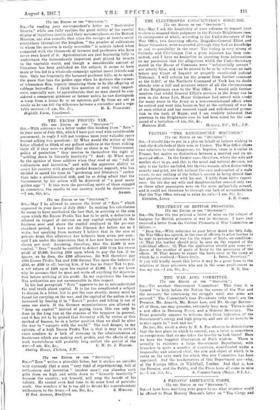CTo THE EDITOR or THE '• SPECTATOR,”1 Sta,—May I be
allowed to answer the letter of " Zero " which appeared in your issue of July 28th? In making his calculation he seems to have overlooked the fact that, in arriving at the sum upon which the Excess Profits Tax has to he paid, a deduction is allowed in respect of interest on any capital employed in the business over and above the capital employed in the pre-war standard period. I have not the Finance Act before me as I u-rite, but speaking from memory I believe that in the case of private firms this allowance has hitherto been seven per cent.. and I am under the impression that it has now been increased to eleven per cent. Assuming, therefore, that the 21,000 is new capital, " Zero " would be entitled to dednet £550 from his excess profit of 21,000, leaving 2450 upon which to pay the tax, if we ignore, as he does, the 2290 allowance. He Will therefore pay £280 Excess Profits Tax and 2160 Income Tax upon the balance of £610, or .2520 in all, tearing him, if lie has no Super Tax to pay, a net return of 2380 upon Isis capital of f5,000. I do not know why he assumes that he must not write off anything for deprecia- tion before arriving at his profit. In my experience the Income Tax authorities are not unreasonable iu this respect.
In his last paragraph " Zero " appears to me to misunderstand the real truth about capital. It is far too complicated a subject to discuss in a letter, but to put the case shortly, money must be found for carrying on the war, and the capital of the nation is not increased by leaving it in "Zero's" pocket and taking it out of some one else's. If the German manufacturers are allowed to "heap up capital" instead of paying taxes, this can only be done in the long run at the expense of the taxpayer in general, and it has yet to be proved that Germany will, by virtue of this method of finance, be in a better position than we shall be after the war to "compete with the world." The real danger, in my opinion, of a high Excess Profits Tax is that it may in certain cases conduce to a lack of economy in the administration of businesses which are making such profits, and the effects of any such wastefulness will probably long outlast the period of the


























 Previous page
Previous page